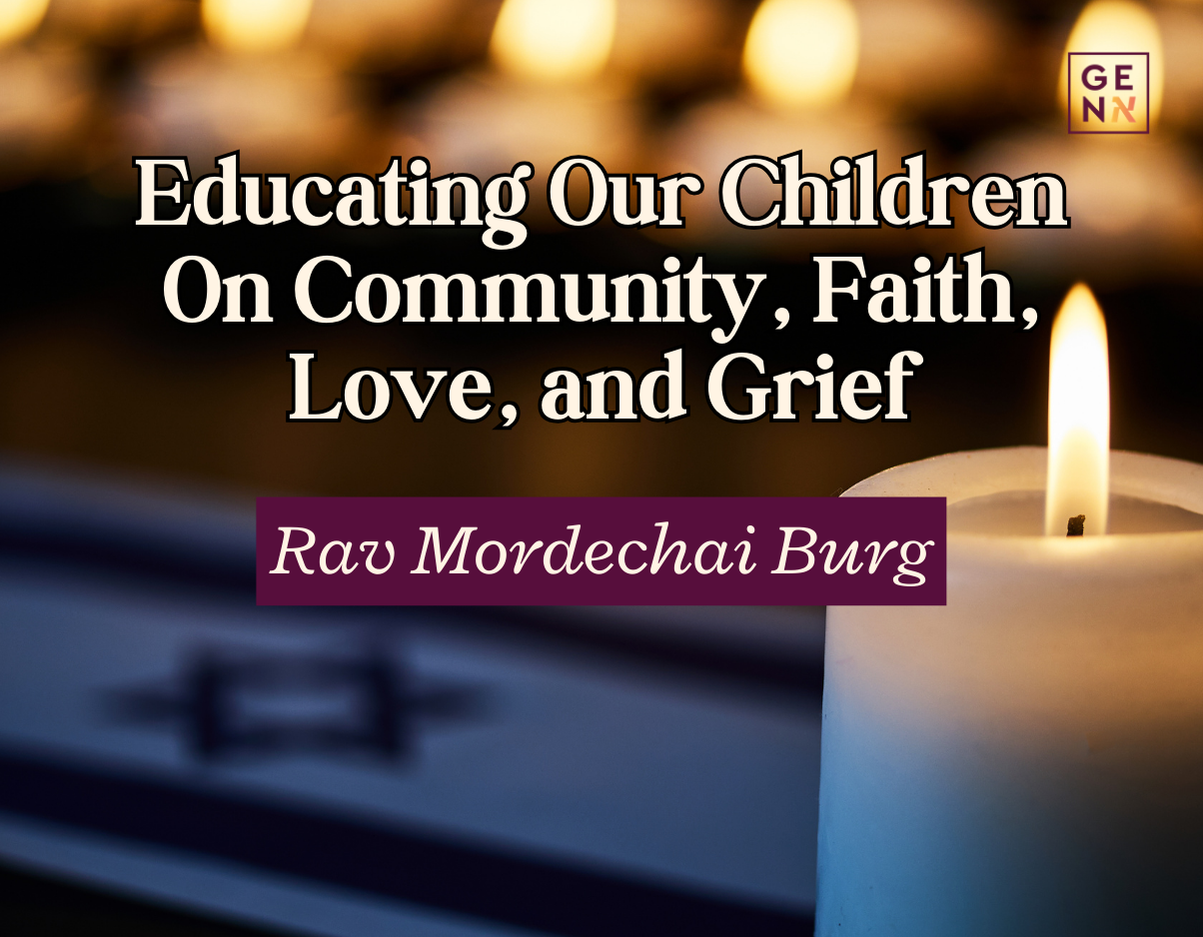דַּבֵּ֞ר אֶל־כָּל־עֲדַ֧ת בְּנֵֽי־יִשְׂרָאֵ֛ל וְאָֽמַרְתָּ֥ אֲלֵהֶ֖ם קְדשִׁ֣ים תִּֽהְי֑וּ כִּ֣י קָד֔וֹשׁ אֲנִ֖י יְהוָֹ֥ה אֱלֹֽהֵיכֶֽם:
Speak to the entire congregation of the children of Israel, and say to them, You shall be holy, for I, the Lord, your God, am holy. (Vayikra 19:2)
Until this point Sefer Vayikra has largely focused on Korbanos, the Mishkan and the Kohanim. Parshas Kedoshim broadens the laws of holiness from the elite to the people. Judaism is not limited to holy places (Mishkan) and holy procedures (Korbanos) by holy people (Kohanim), it is about all people in all of life. Klal Yisrael is gathered and commanded to be holy because Hashem is holy. It is, what Chief Rabbi Dr. Lord Jonathan Sacks of blessed memory calls the democratization of holiness. Other ancient societies and civilizations had temples and priests and sacrifices etc… Judaism was the first religion to say that holiness is manifest not only in the sublime but also in the prosaic. It is expressed in the way we conduct business, in our courts of law, in the way we treat the stranger. Rabbi Sacks explains that it is not revolutionary to declare that a human being could be made in the image of God. Ancient Kings and Pharaohs drew their power and authority from the fact they were the representatives of God in this world. The revolution of Judaism is that all human beings are created in the image of God. All human beings have this fundamental dignity and are called upon to lead lives of holiness that are aligned with our essential Godliness.
The commandment to be holy at first blush seems to be a daunting one. Can the common man achieve a state of holiness? Can life outside of the Beis HaMikdash be as sanctified as the one within the Temple?
Rabbi Lawrence Kelemen tells a story that, while I heard it initially many years ago, continues to inspire me until this day. The Kelemens who live in Yerushalayim decided to take a day trip to Netanya. Procedure, as every parent will tell you, is that everyone MUST use the bathroom before leaving for the trip. The Kelemens, being wise and experienced parents, made sure that every child was prepared for the trip. The trip from Yerushalayim to Netanya is not a short one and Rabbi Kelemen naturally bought tickets for the express bus that makes no stops in between point A and point B. The ride generally takes between an hour and an hour and a half. Not ten minutes into the trip, Rabbi Kelemens son, Hillel Yeshayahu, turns to Rabbi Kelemen and says that he needs to go to the restroom. Hillel Yeshayahu was the child’s given name but everyone called him Kadosh. After giving birth Rebbetzin Kelemen looked at the child and said, “what a Kadosh” and the name stuck. Rabbi Kelemen looked at Kadosh and said, “that’s impossible you just went to the bathroom!” Attempting to placate the child Rabbi Kelemen said that they would be arriving in Netanya soon. Fifteen minutes later Kadosh made it clear that his issue was not going to simply go away. Rabbi Kelemen attempted to persuade the bus driver to pull over but as it was an express bus the driver refused. By the time they arrived in Netanya, Kadosh was in Rabbi Kelemens words “scrunched up like a pretzel”. As it would happen (and somehow it always happens this way), the bathroom at the central Netanya bus station was under construction. The Kelemen children ran to the nearby boardwalk to find a store that had a bathroom Kadosh could use. They ran from store to store but with no luck. Finally one of the children said that he found a restroom in a bar. Little innocent Hillel Yeshayahu “Kadosh” Kelemen said, “What’s a bar?” His brother responded, “It’s a place where people listen to loud music and drink alcohol.”
Hillel Yeshayahu looked up at Rabbi Kelemen and said, “I can’t go into a bar.”
Rabbi Kelemen screamed, “Why not?!?”
Hillel Yeshayahu responded, “Because I am Kadosh.”
Rabbi Kelemen never told his kids they couldn’t go into a bar. He had no reason to make rules and regulations that would include a bar. Especially not at that age. But if you tell your son he is Kadosh for a long enough time he will believe you and act accordingly. Every day that Hillel Yeshayahu was called Kadosh by his parents, teachers, friends and neighbors they were reinforcing the idea that he was meant to live a life with a higher level of dignity. And in a crucial moment, when things were not easy for a young child, he made a choice that reflected his educational upbringing. Hashem does not simply tell us to lead holy lives, He commands us to be holy people. We can do so because He is holy and we carry within us a spark of Him. It is His dignity that lives within each and every one of us. Not just in kings and priests but in all people. Is it a daunting task to lead a holy life? It certainly is. Is it possible? Absolutely. It is our design. When Hashem calls upon us to be a holy people we must hear this commandment the way that Hillel Yeshayahu heard himself being called Kadosh. Not only as a call to action but as an expression of our essence. When we know with certainty who we are we have no choice but to live accordingly. A Jew who knows that he is holy could no more act unholy than a wealthy man could walk proudly in tattered rags. It is simply not who we are.
As parents we walk a fine line between setting a high bar for our children and allowing for our flexibility as our children discover their own path. It seems to me that some parents allow for very little flexibility while others simply lower the bar or remove it completely. The latter is a failure to maintain the standards of being an Am Kadosh. When we set standards appropriately our children can and will rise to the occasion. While there are many examples that we could speak about, I would like to address the issue of how we treat Shabbos. The pasuk in Yeshayahu (58:13) says:
אִם־תָּשִׁ֚יב מִשַּׁבָּת֙ רַגְלֶ֔ךָ עֲשׂ֥וֹת חֲפָצֶ֖יךָ בְּי֣וֹם קָדְשִׁ֑י וְקָרָ֨אתָ לַשַּׁבָּ֜ת עֹ֗נֶג לִקְד֚וֹשׁ יְהֹוָה֙ מְכֻבָּ֔ד וְכִבַּדְתּוֹ֙ מֵֽעֲשׂ֣וֹת דְּרָכֶ֔יךָ מִמְּצ֥וֹא חֶפְצְךָ֖ וְדַבֵּ֥ר דָּבָֽר:
If you restrain your foot because of the Sabbath, from performing your affairs on My holy day, and you call the Sabbath a delight, the holy of the Lord honored, and you honor it by not doing your wonted ways, by not pursuing your affairs and speaking words.
The Gemara in Shabbos (113a) tells us that a part of honoring the Shabbos is not to wear clothing on Shabbos the way that he would during the week. The Arizal (cited in the Magen Avraham 262:2) says that one should not wear anything on Shabbos that was worn during the week. Rav Simlai taught (Yerushalmi Peah 8:7) that one should have two sets of clothing: one for Shabbos and one for weekdays. The Mishna Berura (262:6) says that even if one is alone for Shabbos he should still dress in Shabbos clothing because he is not honoring the people who will see his clothes but Shabbos herself. Sadly, in some communities Shabbos clothing has devolved into nice weekday clothing. While there is no violation of Shabbos, it fails to meet the standard of the Kedusha of Shabbos. It lacks the regal bearing that Shabbos ought to command. I remember shopping with my mother for a new Shabbos suit. It was an important Chinuch lesson on how Shabbos was to be treated. Unfortunately we can see the larger impact. As we dressed down for Shabbos, behavior that failed to meet the standard of “Shabbosdik” was soon to follow. Life is often a slippery slope. Chazal (Yerushalmi Ta’anis 4:5, quoted by the Beis Yosef, O.C. 308) tell us that the city of Tur Shimon was destroyed on account of playing ball. The commentators explain that ball playing itself was not a problem but because they were playing ball on Shabbos the city was destroyed (see Rokeiach 55, Pnei Moshe, and Korban Eidah on Yerushalmi, Medrash Eichah 2:4). Aside from any Halachik considerations, it is clear from the Poskim (Mishnah Berurah 518:9) that playing ball on Shabbos is not an appropriate behavior. I remember well the Shmoozen that I heard from my Rosh HaYeshiva, HaRav Yaakov Bender shlit”a on the topic of playing ball on Shabbos. With great passion he spoke about how even if one could avoid violating the Halachos of Shabbos, playing ball was not in accordance with the dignity and majesty of Shabbos. Bear in mind that I may have been 12 years old when I heard Rabbi Bender’s impassioned plea but the lesson he imparted to us remains with me until today. And while I readily admit that I cannot define with precision what does and does not constitute Shabbosdik dress and behavior, I think we can all acknowledge, even those who will strongly disagree with where I have drawn the line, that Shabbos observance among our youth is not what it once was. I would argue that one could draw a straight line from the diminishing standards of Shabbos dress and behavior to teen cell phone use on Shabbos. To be clear, I am by no means arguing that a teenager who is raised in a home where they wear suits on Shabbos will not struggle with Shemiras Shabbos. Nor am I arguing that a child who was raised in a home with different standards of dress on Shabbos will surely violate Shabbos. Both are empirically untrue. However, if we want our children to value Shabbos then we must treat Shabbos as something fundamentally unique. Shabbos ought to inform the way we dress, the way we speak (SA 307:1), the way we act. It has to mean more than just family time and a break from technology. Our observance of Shabbos ought to reflect the idea that when Hashem created the world He spent the seventh day resting and observing His creation and we have been invited to join Him in this special time. A gentile that keeps Shabbos is punishable by death (Sanhedrin 58b). It is our unique time with Hashem. If we lose sight of the soul of Shabbos, if we lose sight of the majesty of Shabbos, if we lose sight of the Kedusha of Shabbos, then the observance of Shabbos is certainly in jeopardy.
I am concerned that if we fail to teach our children the Kedusha of Shabbos, we are failing to teach them about what it means to be a Kadosh. To lead a life of Kedusha not only in Yeshiva and in Shul but at home and in our business. In the way we treat our loved ones and the way we treat the stranger. Hashem set the bar high but within reach. We are Kadosh and we are called upon to lead sanctified lives. If we raise our children to believe that they are Kadosh they too can reach the high standards that have been set forth for us. While lowering the bar may make achievement more readily attainable, it also communicates to our children that they lack the capacity to lead holy lives. It is a failure to impart to them one of the most central teachings of Judaism, that every single one of us, regardless of our position within the hierarchy of life, is equally Godly and capable of making our world a place of Kedusha.
Submit your questions
"*" indicates required fields











